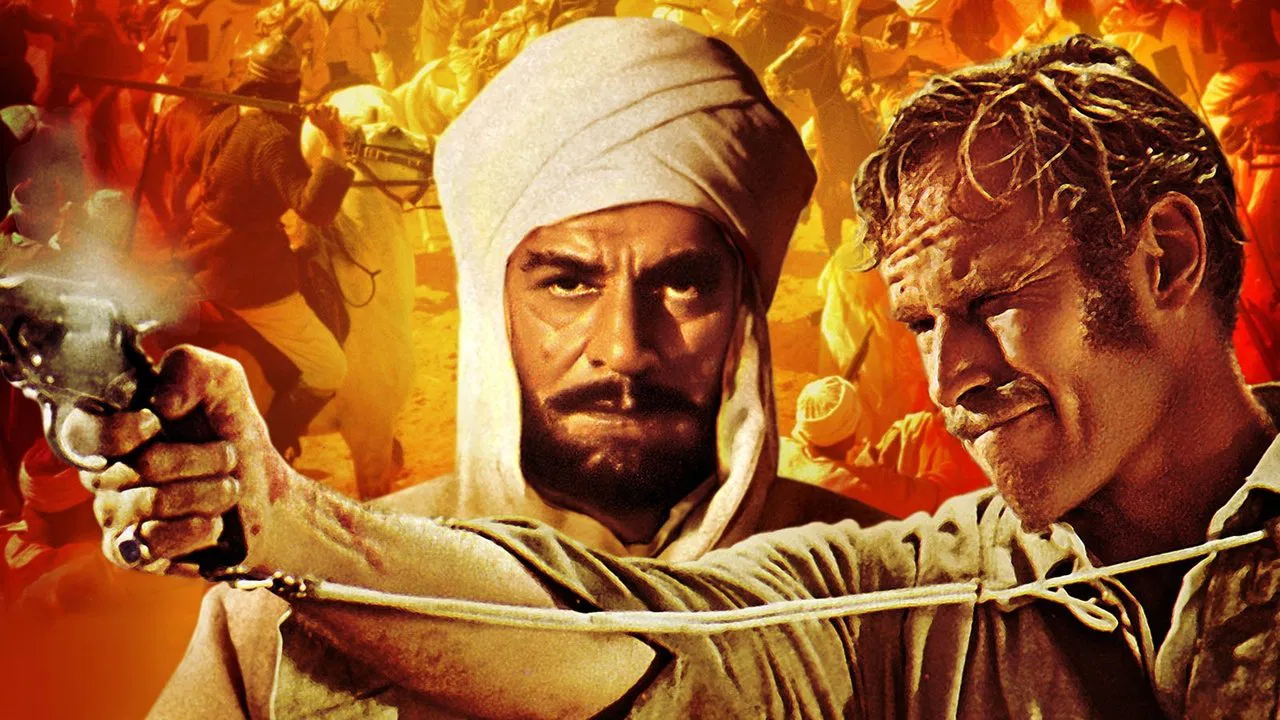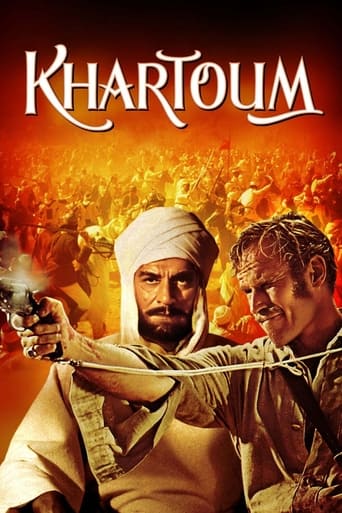

The Worst Film Ever
... View MorePretty good movie overall. First half was nothing special but it got better as it went along.
... View MoreAll of these films share one commonality, that being a kind of emotional center that humanizes a cast of monsters.
... View MoreThe film's masterful storytelling did its job. The message was clear. No need to overdo.
... View MoreCopyright 10 June 1966 by Julian Blaustein Productions. New York opening at the Warner Cinerama: 13 July 1966. U.S. release: 10 June 1966. U.K. general release: 13 August 1968. Australian release: 10 March 1967. Sydney opening at the Plaza in 70mm Cinerama. Also available in 70mm Ultra-Panavision and 35mm Panavision. Running times: 136 minutes (Australia), 130 minutes (U.K.), 128 minutes (U.S.A.).SYNOPSIS: After a British Colonel and his 10,000 untrained Egyptian troops are massacred by a fanatical Arab religious leader, the Mahdi, in the Sudan in 1883, General Charles Gordon, a national hero who has already spent six years in the country, is sent by Gladstone to evacuate the 13,000 troops in Khartoum and the civilians. But he is warned that his mission is unofficial so the government will not promise to back him up. Gordon is in fact in a hopeless situation.NOTES: Robert Ardrey was nominated for a 1966 Academy Award for Best Story and Screenplay (written directly for the screen), losing to "A Man and a Woman".Number 3 at U.K. road show box-offices for 1966.COMMENT: Great spectacle, great cast, fine historical research, meticulously directed and often (especially in its action scenes) excitingly presented. Technical credits are all A-1. Australians were fortunate that the Prologue sequence, directed by Eliot Elisofon, featuring the treasures of the Nile Valley, was retained for local release, whereas this fascinating sequence was cut from many British and American prints.Only one drawback in fact. But an important one: Olivier, who seems not only out of place, but way out of step with the rest of the cast.
... View MoreUnderwhelming. I am a big fan of military dramas, especially those based on historic events, so this movie should have been a lock in terms of liking it. However, it fails to deliver.The biggest setback is Charlton Heston's accent. He's an American putting on a posh English accent, and he sounds it. Just feels so...superficial. Whatever possessed the producers to go with an American in as a 19th century English general is beyond me. At the time, Heston was the go-to actor for heroic roles, so that might explain it.Laurence Oliver is slightly better, as the Mahdi. Hardly recognisable, his accent is someones quite hilarious, and sometimes quite offensive (I would think). Were there no middle-eastern actors available at the time?Plot also seems quite padded. Yes, the political intrigues had to be there to show why General Gordon was in the situation he was in, and did what he did. However, there seems to be a lot of pointless scenes in the movie, particularly in the first half.This said, there are some good battle scenes. Plus, the movie seems fairly true to history (which you can't say about all historical dramas), so is useful as a history lesson.
... View More"Khartoum" is a very obvious case in bizarre casting. Sir Laurence Olivier plays the Mahdi (a Sudanese man) and Charlton Heston plays a Brit! Seeing Olivier in his heavy makeup made his face look like rubber and Heston's British accent sounded a bit odd to me. I assume real Brits would find his accent silly. And, why cast a 6'3" American to portray a 5'5" British man in the first place?! The story is about an uprising in Sudan in the 1880s. It seemed that a man called 'The Madhi' was seen as a holy man--a man who would help his people conquer and instill a government based on Sharia law. When an army of Egyptians went up against him, it was wiped out completely. So, General Gordon agrees to go to Sudan to lead a Sudanese army without much chance of success. As for the British government under Gladstone, it was hesitant to act--after all, he felt this was an internal affair and should be handled by the Africans. To see what happens in this historical film based on real characters, you can either watch this decent film or read up on it in Wikipedia! Overall, a beautifully made film with great music and locales--but the story itself is curiously unmoving and the two leads are not even close to being at their best. Perhaps this might not be true for folks in the UK--as soon after Gordon, the British government finally decided to intervene in the affair.
... View MoreMr. Heston in another monumental movie. I watched this one as a 70mm print, too, but unfortunately it was a German version/print. Heston is great in this movie as mentor/leader and of course also idol, for many people in the movie! The story itself is based on true events and concerns the British Empire and their colonies. Some might not like what they'll see here in this movie, but that doesn't mean the movie wasn't right in showing some things. Still it evolves to much around the Heston character, for my taste and that's why I didn't rate it as high as it could've been, regarding it's story. But watch it, if you like monumental movies and see for yourself.
... View More